Kids & Teen Life: Recovery Journey Resources
November
C.A.S.E. support
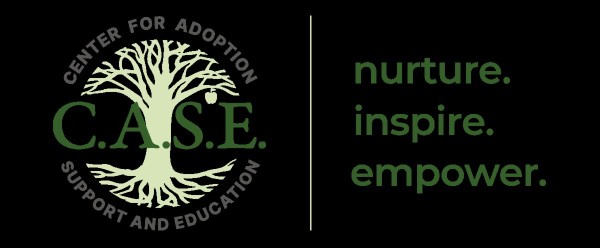 C.A.S.E. is offering a one-time group is for adoptees in Grades 9 – 12 to connect with peers and explore the meaning of the holiday season. Participants will reflect on what makes holidays meaningful, share emotions and experiences, and discuss how to create their own holiday traditions. The group will also learn effective strategies for managing emotions during this time of year and receive helpful resources to support them throughout the season.
C.A.S.E. is offering a one-time group is for adoptees in Grades 9 – 12 to connect with peers and explore the meaning of the holiday season. Participants will reflect on what makes holidays meaningful, share emotions and experiences, and discuss how to create their own holiday traditions. The group will also learn effective strategies for managing emotions during this time of year and receive helpful resources to support them throughout the season.
This Holiday 2025 Teen Support Group will meet on Zoom, Wednesday, November 12, 2025 at 6:00 – 7:30pm EST. register at: Holiday 2025 Teen Support Group - C.A.S.E.
NACoA Support
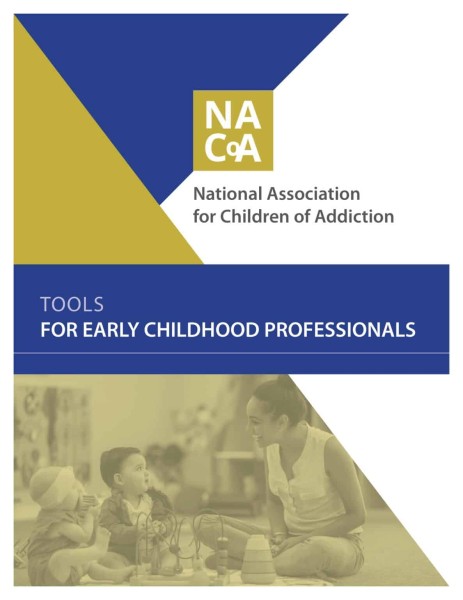 The National Association for Children of Addiction appreciates the unique position of Early Childhood Professionals, caring adults who lay the groundwork and foundational skills in the formative years so young children can be healthy and resilient. For children in families affected by SUDs, their role becomes more important, and the Tools for Early Childhood Professionals can help. Check out this resource that assists and empowers professionals to recognize the uniqueness when working with these families, and how to advocate for their best interests in a gentle, respectful way.
The National Association for Children of Addiction appreciates the unique position of Early Childhood Professionals, caring adults who lay the groundwork and foundational skills in the formative years so young children can be healthy and resilient. For children in families affected by SUDs, their role becomes more important, and the Tools for Early Childhood Professionals can help. Check out this resource that assists and empowers professionals to recognize the uniqueness when working with these families, and how to advocate for their best interests in a gentle, respectful way.
COA Awareness Week
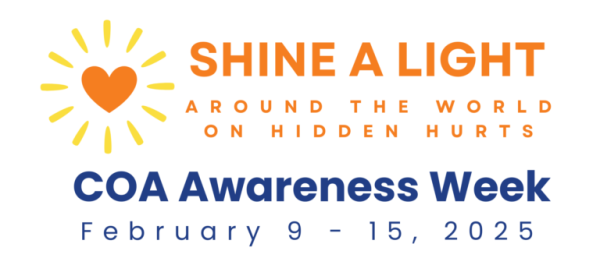 COA Awareness Week honors the struggle of children dealing with the disease of addiction in their families and empowers caring adults who want to help them. Together, we can make a difference to last a lifetime! Join this international awareness campaign and shine a light on the hidden pain and suffering of vulnerable kids and teens impacted by the disease of addiction in their families. They often believe it is their fault, and they are responsible to “fix” the person and save their families. All children deserve the hope and healing that can transform their lives.
COA Awareness Week honors the struggle of children dealing with the disease of addiction in their families and empowers caring adults who want to help them. Together, we can make a difference to last a lifetime! Join this international awareness campaign and shine a light on the hidden pain and suffering of vulnerable kids and teens impacted by the disease of addiction in their families. They often believe it is their fault, and they are responsible to “fix” the person and save their families. All children deserve the hope and healing that can transform their lives.
Teen Holiday Virtual Support Group
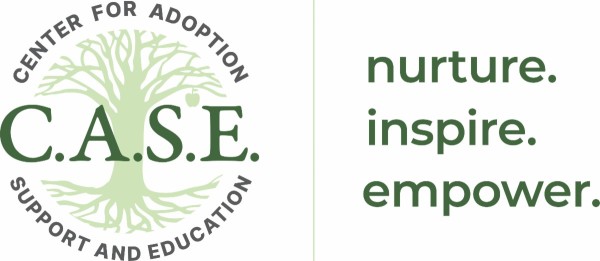 This is a one-time group for adoptees in grades 9-12. Adoptees will be able to connect with other adoptees to explore what makes a holiday meaningful, explore emotions and feelings during the holidays, and to discuss creating traditions during the holidays. Additionally, adoptees will learn effective strategies for coping with emotions throughout the holidays. Adoptees will also be provided with a variety of helpful resources to support them during these times. Join on Wed., Nov. 20, 2024 | 5:00-6:30pm CT.
This is a one-time group for adoptees in grades 9-12. Adoptees will be able to connect with other adoptees to explore what makes a holiday meaningful, explore emotions and feelings during the holidays, and to discuss creating traditions during the holidays. Additionally, adoptees will learn effective strategies for coping with emotions throughout the holidays. Adoptees will also be provided with a variety of helpful resources to support them during these times. Join on Wed., Nov. 20, 2024 | 5:00-6:30pm CT.
Learn About the Helpline
 Whether you are a parent, grandparent, aunt, uncle, sibling or other caregiver — the Partnership to End Addiction helpline is here for you and anyone else providing a supportive role in the life of someone struggling with substance misuse. There is no one-size-fits-all approach and each family is unique. The specialists can offer course of action, offering the best tools and resources to help you help your child, yourself and your family.
Whether you are a parent, grandparent, aunt, uncle, sibling or other caregiver — the Partnership to End Addiction helpline is here for you and anyone else providing a supportive role in the life of someone struggling with substance misuse. There is no one-size-fits-all approach and each family is unique. The specialists can offer course of action, offering the best tools and resources to help you help your child, yourself and your family.
Go to: Helpline: Get One-on-One Help - Partnership to End Addiction (drugfree.org)
Resources for Recovery
As we enter Recovery Month 2024, there are many resources to access and learn about recovery for families and communities. The Partnership to End Addiction understands recovery is an ongoing process and they are available every step of the way to ensure families are prepared to support their loved one. Many families have children in recovery, and what that word means to each can vary. While the process can be challenging, there are ways to reduce the risks associated with substance use and promote well-being.
Learn more at the: Recovery Resource Center at: Partnership to End Addiction (drugfree.org)
Stories of Struggle, Triumph and Resilience
 Recovery is possible!! In sharing stories of life struggles and the successes, you may be helping another move forward on the journey! Share your story. The Partnership to End Addiction offers stories of those with lived experience as they share how their lives and those of their family members have been impacted by substance use and addiction.
Recovery is possible!! In sharing stories of life struggles and the successes, you may be helping another move forward on the journey! Share your story. The Partnership to End Addiction offers stories of those with lived experience as they share how their lives and those of their family members have been impacted by substance use and addiction.
Are You Ready for a Job Interview?
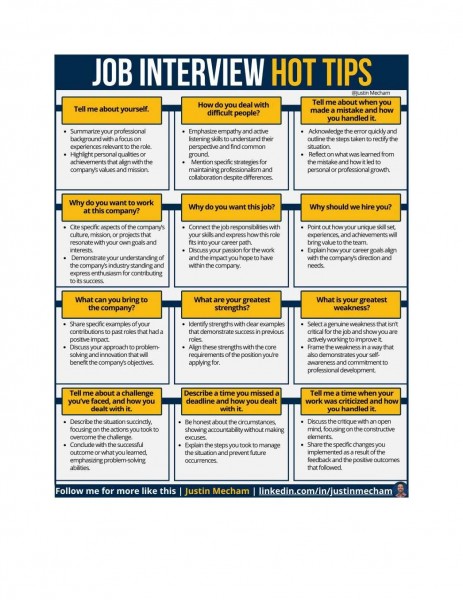
As we enter summer and school is out, many teens and young adults are seeking employment for summer or for long term. Being prepared for an interview in important. Attached is a great guide for how to learn more about the process of a successful interview. Take a look and think about how you will address the employment opportunity.
For Kids and Families from the Sesame Street Friends
 If the past few years have been a challenging for you and your young ones, you are very likely to be managing some mental health issues for both your little ones and maybe, for yourself. With changes in lifestyles, pandemic restrictions and schools going virtual, caregivers are struggling to move forward. Sesame Street’s Elmo is not the only friend wanting to help. All the Sesame furry fuzzy friends are ready to help you talk to your kids about their feelings, help them label them, and find ways to manage them. Noticing children’s real emotional distress can be a big issue and somewhat overwhelming for caregivers. We may be concerned about saying or doing the wrong thing. To consider how to best care for little ones, one good resource is Elmo and friends. Take time to read and try the list of six mental health activities that may help.
If the past few years have been a challenging for you and your young ones, you are very likely to be managing some mental health issues for both your little ones and maybe, for yourself. With changes in lifestyles, pandemic restrictions and schools going virtual, caregivers are struggling to move forward. Sesame Street’s Elmo is not the only friend wanting to help. All the Sesame furry fuzzy friends are ready to help you talk to your kids about their feelings, help them label them, and find ways to manage them. Noticing children’s real emotional distress can be a big issue and somewhat overwhelming for caregivers. We may be concerned about saying or doing the wrong thing. To consider how to best care for little ones, one good resource is Elmo and friends. Take time to read and try the list of six mental health activities that may help.
Check out: 6 Engaging Mental Health Activities for Kids and Families from Sesame Street - Sesame Workshop
Mental Health Month: Time to Talk
 In-person talks promote healthy mental development. This Mental Health Awareness Month, talk to your children and teens about mental health. Need help getting started?
In-person talks promote healthy mental development. This Mental Health Awareness Month, talk to your children and teens about mental health. Need help getting started?
Check out the resource at: samhsa.gov/mental-health/how-to-talk/parents-and-caregivers #MHAM2024 #MentalHealthMatters
Foster Care “Aging Out” Statistics:
 As depressing as that sounds, that is the reality for 23,000 kids age out of the foster care system every year. It’s called “aging out.” This means the government no longer has jurisdiction over a child. Once foster children reach a certain age, they no longer qualify for government benefits. The loss of benefits is not the only issue that makes this the jump into an extremely difficult adulthood. Children, often placed in the foster care system due to neglect or abandonment, age out because they were never adopted. At 18, too often they’re not ready. Youth who age out of foster care belong to one of most vulnerable and at-risk groups in America. With out a strong plan in place the following may occur:
As depressing as that sounds, that is the reality for 23,000 kids age out of the foster care system every year. It’s called “aging out.” This means the government no longer has jurisdiction over a child. Once foster children reach a certain age, they no longer qualify for government benefits. The loss of benefits is not the only issue that makes this the jump into an extremely difficult adulthood. Children, often placed in the foster care system due to neglect or abandonment, age out because they were never adopted. At 18, too often they’re not ready. Youth who age out of foster care belong to one of most vulnerable and at-risk groups in America. With out a strong plan in place the following may occur:
- 1-in-4 won’t graduate from high school or be able to pass their GED;
- 20% will become instantly homeless;
- 60% will be convicted of a crime;
- 50% of foster children have no income within their first four years of aging out;
- Those who do have an average annual income of $7,500;
- Between 3% and 10.8% of foster care alumni have a bachelor’s degree.
Learn more about resources to help this time to be safer and more supportive.
Check out: Resources at: Aging Out of Foster Care: Financial Help & Transition Programs (incharge.org)
National Drug and Alcohol Facts Week®
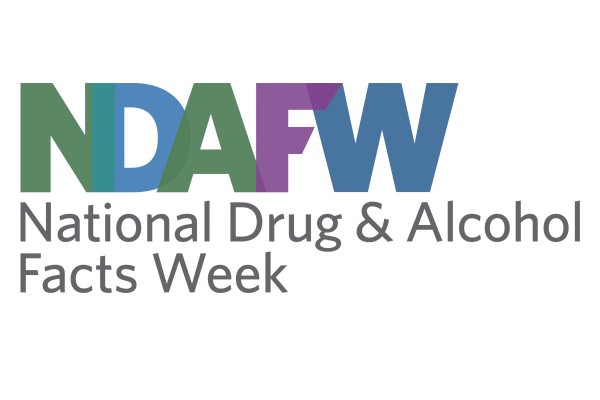 Participate in National Drug and Alcohol Facts Week® (NDAFW) and help share facts about drugs, alcohol, and addiction in your community. NDAFW is an annual health observance that inspires dialogue about the science of drug use and addiction among youth. NDAFW provides an opportunity to bring together scientists, students, educators, healthcare providers, and community partners to help advance the science and address youth drug and alcohol use in communities and nationwide. Sign up for NDAFW email updates below, and find lots of great resources for planning and promoting your very own NDAFW event. Mark your calendar for National Drug and Alcohol Facts Week, March 18–24, 2024
Participate in National Drug and Alcohol Facts Week® (NDAFW) and help share facts about drugs, alcohol, and addiction in your community. NDAFW is an annual health observance that inspires dialogue about the science of drug use and addiction among youth. NDAFW provides an opportunity to bring together scientists, students, educators, healthcare providers, and community partners to help advance the science and address youth drug and alcohol use in communities and nationwide. Sign up for NDAFW email updates below, and find lots of great resources for planning and promoting your very own NDAFW event. Mark your calendar for National Drug and Alcohol Facts Week, March 18–24, 2024
Learn more: National Drug and Alcohol Facts Week® (NDAFW) | National Institute on Drug Abuse (NIDA) (nih.gov)
